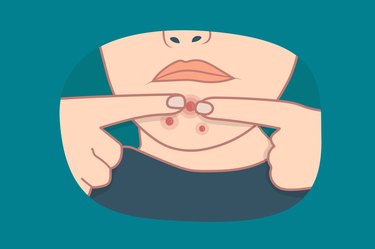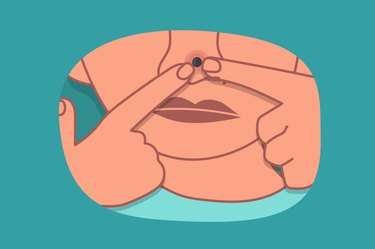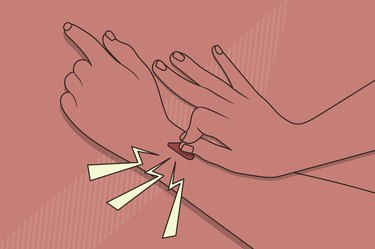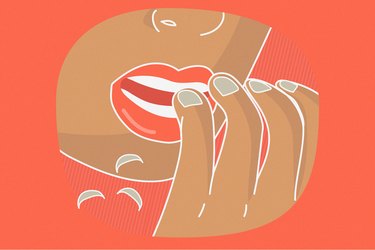
For some, big, boil-like pimples practically beg to be popped. But the satisfaction won't last long. Squeezing cystic acne can cause some unpleasant — and potentially harmful — consequences, so you're better off steering clear.
That doesn't mean you're stuck with a cyst, though. Read on to find out about the risks of popping cystic acne, how to manage acne cysts at home and when it's worth getting the help of a dermatologist.
Video of the Day
What Is Cystic Acne?
Cystic acne is different from the occasional blemish or blackhead. It's a type of severe, inflammatory acne marked by large (think pea- to dime-sized) and often painful pimples.
"A cyst is a defined, firm bump filled with fluid or pus," says Heather Woollery-Lloyd, MD, a board-certified dermatologist and director of the Skin of Color Division for the University of Miami Miller School of Medicine. "Cysts feel firm when you touch them and are often tender." Other times, cysts feel softer and fluid-filled.
You might notice that the cyst oozes pus or gets crusty, too.
Regular pimples form when pores get clogged with dead skin cells and oil. But the clogged pores that cause cystic acne also contain bacteria, which is what causes them to become inflamed and uncomfortable, according to the Cleveland Clinic.
Shifting hormones make cystic acne especially common during the teenage years as well as in menopause, but ultimately, anyone can be affected.
The Effects of Popping Cystic Acne
Trying to pop an acne cyst can be tempting, but just like when you pop a smaller pimple, you'll end up doing more harm than good.
1. You Might Leave a Mark
"When you pop a pimple on the outside, sometimes it pops on the inside of your skin too," Dr. Woollery-Lloyd explains. "That can lead to inflammation and more irritation of the skin."
As a result, you're more likely to end up with a scar or hyperpigmentation that could take months or years to fade. (These remedies for acne scars might help if the damage has already been done.)
2. You Could Make Your Acne Worse
Making matters worse is the fact that popping just might end up making your acne worse because it pushes bacteria from the cyst (as well as your hands, if they're not clean) back into your skin. This can end up creating new or worse cysts, Dr. Woollery-Lloyd notes.
3. You Might Cause an Infection
Bacteria from the cyst or your hands could easily lead to an infection, Dr. Woollery-Lloyd says.
In some cases, the infection could become serious enough to warrant the use of antibiotics, the Cleveland Clinic notes.
Can You Pop Cystic Acne Safely?
First, the bad news: There's no good way to pop an acne cyst at home. (That job should be reserved for your dermatologist.) The good? There are steps you can take to bring down the pain, swelling and inflammation at a slower pace.
1. Apply a Warm, Wet Compress
If you want to get rid of a cyst on your own, Dr. Woollery-Lloyd recommends applying a warm, wet compress to the affected area several times daily.
"This will help things to move along and encourage the cyst to open and drain naturally with less trauma," she says.
2. Use a Spot Treatment
You can also apply an over-the-counter gel or cream to the affected area containing 2.5% benzoyl peroxide, which helps kill off bacteria and get rid of excess oil and dead skin, according to the Mayo Clinic. (Try Neutrogena On-The-Spot Acne Treatment: $6.82 at Amazon.com.)
3. See a Dermatologist
If you have a cyst that needs to be addressed ASAP, see your dermatologist.
"We can use a sterile needle to puncture the cyst and drain it gently," Dr. Woollery-Lloyd says. "The other benefit is that we can inject a small amount of steroid to bring down the inflammation more quickly."
When to See a Doctor for Cystic Acne
It's fine to treat one-off acne cysts at home if that's what you prefer. But you should see a dermatologist if you have a cyst that you want to get rid of ASAP or if you're plagued by cystic breakouts on a regular basis. "True cystic acne is best managed by a board-certified dermatologist," says Dr. Woollery-Lloyd. "There are many effective prescription treatments that manage cystic acne with great results."
Oral antibiotics, prescription-strength creams or gels, oral birth control, spironolactone and oral retinoids (such as isotretinoin) can all be effective, though it can take some time. Most people will see results in about three months, notes the Cleveland Clinic.
So, How Bad Is It Really to Pop Cystic Acne?
Popping an acne cyst generally isn't a life-or-death situation, but it won't do your skin any favors. Even if you manage to drain the cyst, there's a good chance you'll end up with scarring, hyperpigmentation or another breakout, and in some cases you could develop a nasty skin infection.
Warning
There is a rare risk that popping a pimple in what is nicknamed the "triangle of death" could lead to an infection that can travel to the brain. If you draw a triangle from the bridge of your nose to each corner of your mouth, this represents the area where blood flow is connected to a network of veins called the cavernous sinus that has a direct connection to the brain. The area of concern is inside this triangle.
Was this article helpful?
150 Characters Max
0/150
Thank you for sharing!
Thank you for your feedback!
Is this an emergency? If you are experiencing serious medical symptoms, please see the National Library of Medicine’s list of signs you need emergency medical attention or call 911.



